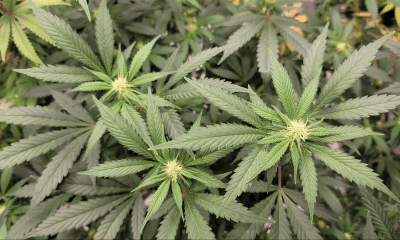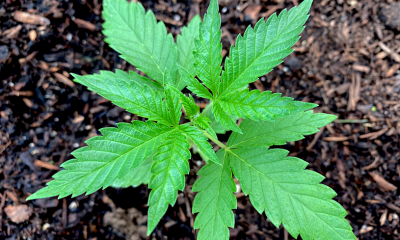Politics
Key Senate Committee Chairman Scaled Back Marijuana Amendment On Security Clearance Denials To Secure Passing Vote

When the Senate Intelligence Committee voted last month to approve an amendment prohibiting the denial of security clearances for intelligence agents over past marijuana use, what it ended up adopting was actually a dialed-back version of an original proposal that would have provided even broader protections, according to a newly published report from the panel.
And the vote tally, which was not publicly available around the time of initial news reports on the measure, shows that the revised version actually attracted unexpected support from certain lawmakers, including anti-legalization Sen. Tom Cotton (R-AR).
As originally drafted, the amendment to the Intelligence Authorization Act from Sen. Ron Wyden (D-OR), along with Sens. Martin Heinrich (D-NM) and Kirsten Gillibrand (D-NY) would have “prohibited any Federal agency from denying or revoking an individual’s eligibility for access to classified information solely because of past or present use of cannabis,” the report says. (Emphasis added.)
But Chairman Mark Warner (D-VA) filed a second-degree amendment, cosponsored by Sen. Michael Bennet (D-CO), to scale back Wyden’s proposal. The version that was ultimately approved by the committee in a 11-5 vote narrowed its applicability to federal workers in the intelligence community, such as those employed by the FBI, CIA and NSA. And the language on “past or present” marijuana use was changed to say simply that “pre-employment” cannabis consumption could not make an agent ineligible for access to classified materials.
A spokesperson for the chairman’s office explained to Marijuana Moment on Tuesday that the “initial version of the amendment did not have enough votes to pass, so Senator Warner offered a revised version that could secure a majority on the Committee.”
The vote on the modified amendment generated support from some notable members, including Cotton and Sens. Susan Collins (R-ME) and Dianne Feinstein (D-CA), who have historically resisted or outright opposed marijuana legalization.
Feinstein has been supportive of other modest policies, however, including expanding cannabis research, as would be accomplished through a bill she recently filed alongside Sens. Brian Schatz (D-HI) and Chuck Grassley (R-IA). Collins has also backed proposals on marijuana banking reform and veterans cannabis access.
There’s also a “no” vote on the amendment that stood out from Sen. Angus King (I-ME), who caucuses with Democrats and has championed certain cannabis policies related to research and banking access, for example.
—
Marijuana Moment is tracking more than 1,500 cannabis, psychedelics and drug policy bills in state legislatures and Congress this year. Patreon supporters pledging at least $25/month get access to our interactive maps, charts and hearing calendar so they don’t miss any developments.
![]()
Learn more about our marijuana bill tracker and become a supporter on Patreon to get access.
—
In any case, Wyden isn’t throwing in the towel on passing broader protections on this issue. A spokesperson for his office told Marijuana Moment on Wednesday that the senator is “looking at broadening the provision to apply to all clearance holders, not just those working for the Intelligence Community.”
The Intelligence Authorization Act marked up in committee has not yet been enacted, but it’s possible he’s suggesting that he will push for broader reforms similar to what was included in his original amendment when the bill comes to the Senate floor, or perhaps later through another legislative vehicle.
Read the full Intelligence Committee note on the cannabis amendment vote below:
“By voice vote, the Committee adopted a second-degree amendment by Chairman Warner, and cosponsored by Senator Bennet, to an amendment by Senator Wyden, and cosponsored by Senators Heinrich and Gillibrand. Senator Wyden’s amendment, as cosponsored by Senators Heinrich and Gillibrand, prohibited any Federal agency from denying or revoking an individual’s eligibility for access to classified information solely because of past or present use of cannabis. Chairman Warner’s second-degree amendment, as cosponsored by Senator Bennet, limited the prohibition to Intelligence Community agencies, struck the revocation prohibition, and replaced the ‘‘past or present’’ application with a ‘‘pre-employment’’ application. By a vote of 11 ayes and 5 noes, the Committee adopted the amendment by Senator Wyden, and cosponsored by Senators Heinrich and Gillibrand, as modified by Chairman Warner’s second-degree amendment (cosponsored by Senator Bennet). The votes in person or by proxy were as follows: Chairman Warner—aye; Senator Feinstein—aye; Senator Wyden—aye; Senator Heinrich— aye; Senator King—no; Senator Bennet—aye; Senator Casey—aye; Senator Gillibrand—aye; Vice Chairman Rubio—no; Senator Burr—aye; Senator Risch—no; Senator Collins—aye; Senator Blunt—no; Senator Cotton—aye; Senator Cornyn—no; Senator Sasse—aye.”
Barring people from receiving security clearances just for being honest about prior marijuana use significantly decreases the pool of potential applicants for critical roles, especially considering that a majority of Americans have tried cannabis at least once and more states have moved to legalize the plant for medical or recreational use.
Prior to the House vote to pass a federal marijuana legalization bill in April, Rep. Jamie Raskin (D-MD) filed an amendment to require federal agencies to review security clearance denials going back to 1971 and retroactively make it so cannabis could not be used “as a reason to deny or rescind a security clearance.” But that measure was narrowly defeated in a floor vote.
Late last year, the director of national intelligence (DNI) issued a memo saying that federal employers shouldn’t outright reject security clearance applicants over past use and should use discretion when it comes to those with cannabis investments in their stock portfolios.
A spokesperson in the DNI’s office told Marijuana Moment at the time that “increased legalization of marijuana use at state and local levels has prompted questions on how the federal government treats an individual’s involvement with marijuana to determine eligibility for national security positions or access to classified information.”
Meanwhile, FBI updated its hiring policies in 2020 to make it so candidates are only automatically disqualified from joining the agency if they admit to having used marijuana within one year of applying. Previously, prospective employees of the agency could not have used cannabis within the past three years.
Former FBI Director James Comey in 2014 suggested that he wanted to loosen the agency’s employment policies as it concerns marijuana, as potential skilled workers were being passed over due to the requirement.
“I have to hire a great work force to compete with those cyber criminals and some of those kids want to smoke weed on the way to the interview,” he said at the time.
Also, in 2020, CIA said that it doesn’t necessarily believe using illegal drugs makes you a bad person.
For its part, the Drug Enforcement Administration continues to enforce its policy of automatically disqualifying applicants who’ve used marijuana in the prior three years before applying.
Federal agencies have taken different approaches to employment policies with the ever-changing marijuana landscape in the U.S.
For example, the Environmental Protection Agency (EPA) recently reminded its workers that they are prohibited from using marijuana—or directly investing in the industry—regardless of state law and changes in “social norms” around cannabis.
The nation’s largest union representing federal employees separately adopted a new resolution in support of marijuana legalization and calling for an end to policies that penalize federal workers who use cannabis responsibly while they’re off the clock in states where it is legal.
The White House recently made clear that people who want to even intern at the president’s office will be required to disclose prior drug use—including any cannabis consumption that was legal under state law—and they could be denied eligibility over it.
Still, the U.S. Office of Personnel Management (OPM) separately issued a memo to federal agencies that says admitting to past marijuana use should not automatically disqualify people from being employed in the federal government.
The Biden administration previously found itself facing criticism after reports surfaced that it had fired its own White House staffers over marijuana.
Then-Press Secretary Jen Psaki attempted to minimize the fallout of the White House personnel policy, without much success, and her office also stressed that nobody was fired for “marijuana usage from years ago,” nor has anyone been terminated “due to casual or infrequent use during the prior 12 months.”
However, she consistently declined to speak to the extent to which staff have been suspended or placed in a remote work program because they were honest about their history with marijuana on the federal background check form.
House Appropriations Committee leadership recently urged the White House to “continue to review policies and guidelines regarding hiring and firing of individuals who use marijuana in states where that individual’s private use of marijuana is not prohibited under the law of the State” as part of a Financial Services and General Government (FSGG) spending report.
It specifically requests that the executive branch apply drug testing standards with “consistency and fairness.”
In May, a congressman sent a letter to the head of the U.S. Department of Transportation, stating that the agency’s policies on drug testing truckers and other commercial drivers for marijuana are unnecessarily costing people their jobs and contributing to supply chain issues.
Relatedly, a top Wells Fargo analyst said in February that there’s one main reason for rising costs and worker shortages in the transportation sector: federal marijuana criminalization and resulting drug testing mandates that persist even as more states enact legalization.
Meanwhile, in April, a top federal health agency proposed changes to drug testing policies for federal workers to clarify that having a doctor’s recommendation for medical marijuana or any other Schedule I drug is not a valid excuse for a positive drug test.
Also earlier this year, a coalition of more than two dozen congressional Democrats filed bill on promoting workplace investment to combat climate change, and they said they want to boost the workforce nationwide by protecting people in legal marijuana states from being penalized due to federal drug testing policies.
The Substance Abuse and Mental Health Services Administration (SAMHSA) recently proposed a changes to drug testing policies for federal workers that would clarify that having a doctor’s recommendation for medical marijuana or any other Schedule I drug is not a valid excuse for a positive drug test.
At the state level, Colorado Gov. Jared Polis (D) recently signed an executive order to provide broad professional licensing protections for workers who use marijuana in compliance with state law. The move also prevents state agencies from assisting in any out-of-state investigations related to lawful cannabis conduct that could result in employment penalties.
Also, a union representing firefighters has claimed credit for a New York City legal directive ordering government agencies, including the New York City Fire Department (NYFD) and New York Police Department (NYPD), to cease drug testing workers for marijuana since the state enacted legalization.
Last year, the state Department of Labor separately announced in guidance that New York employers are no longer allowed to drug test most workers for marijuana, with limited exceptions. Even prior to the enactment of legalization, New York City officials had established a local ban on pre-employment drug testing for cannabis.
Washington, D.C. Mayor Muriel Bowser (D) signed a bill last month that prohibits most workplaces from firing or otherwise punishing employees for off-duty marijuana use.
In Missouri, the St. Louis County Council approved a bill in March to ban pre-employment and random drug testing for cannabis for most county workers.














